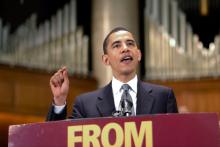Call to Renewal

We at Sojourners were especially blessed to have Peter’s leadership for 26 years on the board of Sojourners and, before that, Call to Renewal, which we and he helped to found on behalf of the poorest and most vulnerable. That was a deep passion for Peter, for those left outside that Jesus told us to bring inside.

CAN THE words “Christian” or “faith” appear in proximity to political issues? And if they do, what should they mean? On May 23, a delegation of U.S. Christian leaders came to Washington, D.C., to proclaim to the press and the country’s political leadership that yes, faith and values are vital to the public life—and if they are genuinely expressed they should transform our discourse, policy, and social fabric. What true biblical faith doesn’t do is let religious conviction be manipulated by partisan politics.
“America is fed up with what many in the church are doing, polarizing us into Left and Right. Christians are called to a politics of reconciliation,” said Tony Campolo at a press conference held that morning. ...

For all the media attention paid to the Religious Right, much less energy has been spent looking into its counterpart, the Religious Left. And yet, when Barack Obama first ran for president in 2008, he appealed directly to religious voters, pairing his Christian faith with his progressive politics—something his Democratic predecessors Jimmy Carter and Bill Clinton did as well.

Editor's Note: Following here below is the text of Barack Obama's keynote address at the Sojourners/Call to Renewal "Building a Covenant for a New America" conference in Washington, D.C., as he delivered it on June 26, 2006.
Having a 3-and-a-half-year-old son has made the horrific revelations about the sexual abuse of children by Catholic priests even more abhorrent. His innocence and vulnerability have been my daily context as I listen to one awful story after another. It makes a person very angry.
Concern for the victims of the widespread sexual abuse has to be our first and overriding concern. Where the Catholic Church and its leaders have begun to fully repent of these terrible sins and make those who have been irreparably damaged its principle priority, it becomes the beginning of healing. But where concerns for the perpetrators, or the priesthood, or the institution, or the financial consequences have dominated the response, the original sin has been seriously compounded. Clearly, the path that must be followed now is to put the welfare of the victims over the protection of the system. Indeed, that is the only way to save and heal the system in the long run.
But what must be done? Some wrongly blame celibacy. But as Richard Rohr explains in his incisive article in this issue, celibacy is not the problem (though some reforms in how it might be implemented may be in order). While I support both the ordination of women priests (my wife is an Episcopal cleric) and the welcoming of married priests, neither of these crucial church reforms would solve the problem either. Both pedophilia (the sexual abuse of children) and the abuse of power in sexual relations with post-pubescent young people are problems in many places, including other churches where women and married priests are accepted. Nor is the problem the prevalence of homosexual men in the Catholic priesthood. Pedophilia is as much a heterosexual illness as a homosexual one. The underlying issue in this terrible church sex scandal is not—as the Left and the Right have variously asserted—celibacy, the lack of women priests or married priests, or the number of homosexuals in the priesthood.
You’d have to go back a long way to find this much church unity—maybe not to the first Pentecost, but a long way, to be sure. Churches in this country, it seems, have been known more for what has divided them than for what brings them together.
But there’s evidence that’s changing. Christian leaders representing 60 Catholic, evangelical, mainline Protestant, and African-American churches—along with major church-based organizations—gathered on the East steps of the U.S. Capitol in February around a commitment and promise: ending poverty in America.
With the launch of Call to Renewal’s Covenant and Campaign to Overcome Poverty, American church leaders are saying that poverty is no longer a bipartisan political tool but a top-priority nonpartisan issue. "The story today is very simple," observed Sojourners editor Jim Wallis, convener of Call to Renewal. "In a time of record prosperity, the poor are being left behind, but the churches are being drawn together. Today we are launching a Covenant that can change our lives and a Campaign that can change this country."
The Covenant begins with a confession: "The persistence of widespread poverty in our midst is morally unacceptable. Just as some of our religious forebears decided to no longer accept slavery or segregation, we decide to no longer accept poverty and its disproportionate impact on people of color."
Joining Wallis on the Capitol steps were John Carr, representing the U.S. Catholic Conference; Rich Cizik, of the National Association of Evangelicals; syndicated columnist Arianna Huffington; Rev. Wallace Charles Smith, representing the Progressive National Baptist Convention; Rev. Bob Edgar, general secretary of the National Council of Churches; Sharon Daly, representing Catholic Charities USA; Mark Publow, of World Vision; and David Beckmann, president of Bread for the World.
Seattle now has nine billionaires and 10,000 millionaires, according to a National Public Radio report a few weeks ago. A recent U.S. News cover story proclaimed, "The Rich Are Getting Richer." Housing prices in economic boom towns like San Francisco leave us in stunned disbelief, as do amazing news reports of investors who gain or lose $6 billion in one week’s stock market trading. Even the overused phrase "record breaking economy" seems old hat now when there are new milestones reached and records broken almost every day.
Clearly the "permanent boom" has done a lot of individual good for many people. But what will it mean for the common good? The same NPR report told of the ever-widening gap between rich and poor and the crumbling of public institutions such as schools. The rates of evictions and homelessness in San Francisco are also skyrocketing, and a very troubling moral picture is emerging. In the same news program, we hear that NASDAQ has reached an all-time high, then learn that new studies show alarming child-poverty rates. We learn that the number of U.S. millionaires has quadrupled from 2 million to 8 million in the last 10 years, but that 1.3 million people will become homeless sometime this year and 30 million people will experience "food scarcity," otherwise known as hunger. A recent New York Times Sunday Magazine cover story speaks of "The Invisible Poor," while a front page piece the same week in the Times explores the consequences of a new syndrome called "affluenza" on the children of the rich.
These gaping moral contradictions and growing spiritual concerns are beginning to awaken the churches, in particular, to their responsibilities and, indeed, to their prophetic vocation. For the first time in more than 100 years, churches from across the political spectrum are coming together on a social issue—poverty. The growing unity includes black churches, Catholics, mainline Protestants, and even conservative evangelicals who recently have been more known for their involvement in other social issues.
To his disciples, Jesus simply said, "follow me." That was an invitation, not a requirement, because an invitation respects the freedom of the invitee to accept or decline. An invitation was extended to the country to come to "Poor No More," the fourth annual National Summit on the Churches and Poverty.
In response to the invitation, more than 550 pastors, lay people, service-providing ministries, community development organizations, and representatives of human services departments gathered at National City Christian Church and the historic Luther Place Memorial Church in Washington, D.C., for three days of worship, prayer, reflection, learning, and sharing.
Conference participants heard powerful messages of hope and determination, from the first evening's opening service led by Harvard University's William Julius Wilson and Rev. James Forbes, Senior Pastor at Riverside Church in New York, to the closing sermons on the conference's last day by Rev. Wallace Charles Smith of Shiloh Baptist Church in Washington, D.C., Noel Castellanos of the La Villita Community Church in Chicago, and Mary Nelson of Chicago's Bethel New Life. Rev. Skip Long, national director of Jobs Partnership, blessed our souls with a creative spin on the Good Samaritan story titled "The Measure of Your Mercy."
Conference goers were also blessed with the joyful noise of song. The opening ceremony had music by Washington, D.C.'s Shiloh Baptist Church Youth Choir and by Darren Ferguson, of Exodus Transitional Community in the Bronx, who was observing the first anniversary of his ordination. Ferguson lifted us up throughout the summit with traditional music, some of which he composed. The trio Divine Blessings (which consists of Rev. Donna Sandiford, Roberta Blair, and Sojourners own Rachel Spaght) blessed us for yet another year with their harmony and interpretation of God's word through their music. Throughout the three days, Ken Medema-utilizing styles from classical to rock and ballads to blues-thoroughly engaged and inspired his audiences. The conference closed with two very strong and stirring renditions from the Call to Renewal "Poor No More" conference choir, which was directed by Sandiford in its first-and only appearance.
One of the most important goals of the Call to Renewal is to unite Christians who traditionally have not worked together, on the issue of poverty. We are using the metaphor of a "roundtable" to describe a new partnership. These local roundtables are not a new organization, but a table that can bring people together for common action.
Organizing these local roundtables is a central part of the development of the Call to Renewal network. It is an opportunity to build new relationships and connections, to engage in vital discussion about the church’s responsibility to the poor. It is a chance to discover new ideas, to explore common ground, and to profile some of the best faith-based programs in the community. An active roundtable can strengthen the voice and impact of the churches in the debate and process of welfare reform in their community and in the deeper biblical mission of overcoming poverty in our society.
Bringing together the right people for planning a roundtable is critical to its success. Representatives from the key Call to Renewal constituency groups—evangelicals, Catholics, historic black churches, Pentecostal, and mainline Protestant—should form the core of the table. Service providers, advocacy groups, local officials, and the business community then round it out.
In many communities, some of these groups already meet together; in very few are they all together. Call to Renewal is becoming the opportunity and the catalyst to bring together a full table. These new multisector partnerships working together can make a significant difference in most communities.
Several notes and e-mails commented on the mention of my then wife-to-be in my column last month.